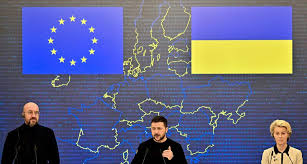The paper explores the role of the European Union (EU) in the war in Ukraine, from the run-up of the war to its impact on the EU’s future structure and functions, within Europe and globally. It begins with an account of the condition of the EU before the war, which it describes as overextended and stagnant with respect to the EU’s proclaimed finalité, the “ever closer union of the peoples of Europe.” Next, it recounts the use of the EU in early American attempts to include Ukraine in the East European enlargement of NATO, with EU membership as a reward for Ukrainian Westernization. To the EU leadership, this presented an opportunity to revive older, by then largely failed attempts at supranational unification and centralization, by offering to the United States to serve as its transatlantic base for its Ukrainian strategy. Following this, the paper explores the consequences for the EU and its stronger member states of the impending American withdrawal from the Ukrainian war theater, as the US turns to its conflict with China. The final section discusses the conditions under which Europe, the European states, and the EU can hope for some kind of strategic and political autonomy in the emerging new New World Order.
Related Articles

Geopolitics
Al Jazeera: UN adding Israel to ‘blacklist’ of countries harming children in conflict
Move comes as Israel’s Gaza war has killed more than 15,500 Palestinian children and fuelled widespread malnutrition. Read HERE

Finance
ITEP: Netflix Posted Biggest-Ever Profit in 2018 and Paid $0 in Taxes
Hugely profitable tech company provides first look at how corporations are faring under new tax law Read here

Climate Crisis
Responsible Statecraft: How Azerbaijan is ‘peacewashing’ its image ahead of COP 29
Baku is hosting the climate summit in November with some help from a high priced PR firm Read HERE


Be the first to comment